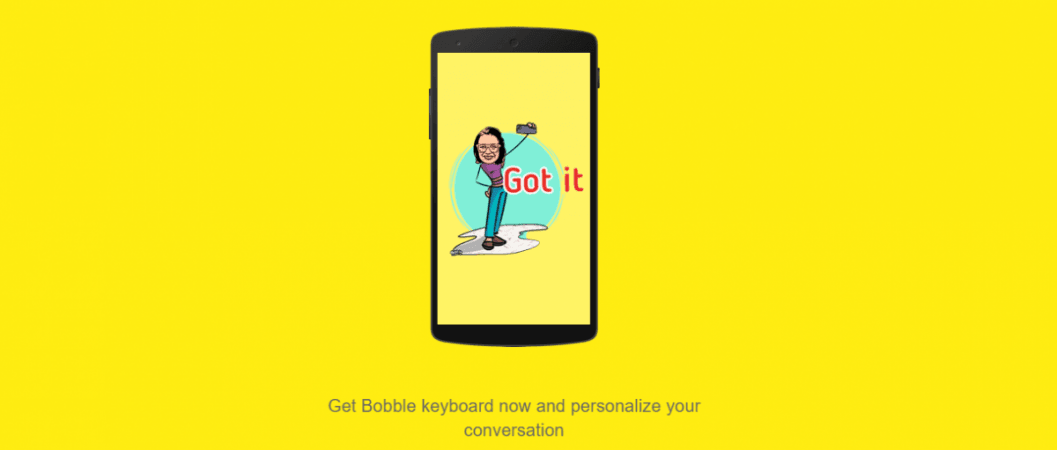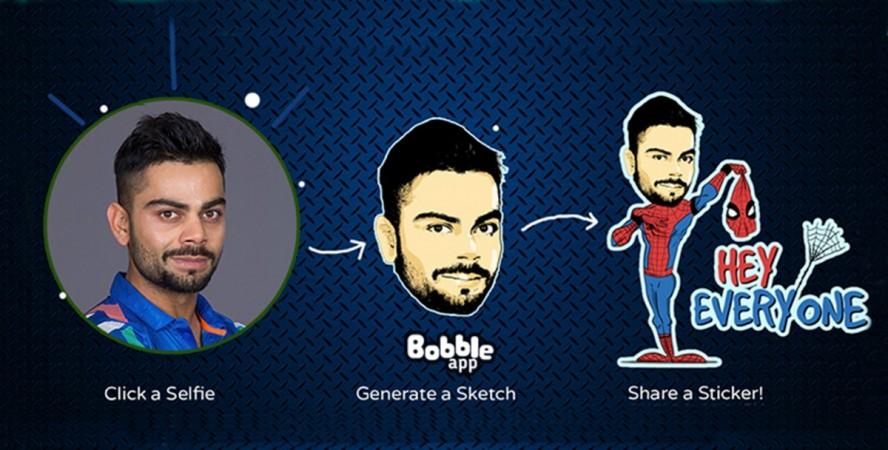
There are hundreds and thousands of apps in the Play Store and App Store for a variety of uses on mobile devices. From dating to booking a cab or even ordering food, there's an app for everything. All these apps have one thing in common, which is the necessity of a keyboard to type your bio on Tinder or your card details for food.
Keyboards are more important than you know it, so a lot of companies have delivered various apps with different levels of customizations. After all, who doesn't like a keyboard that can lessen your pain of typing or even make your typing experience a breeze?
For those who want to personalise their keyboards, Bobble came up with a unique idea of using selfies to take customization to a whole new level. The app is free to download on Play Store and App Store and works with different apps. Bobble uses your photo to unlock personalised stickers, GIFs with your face in it. All of this happens in real time.
The idea behind this unique keyboard app got us cracking on some curious questions. Who's better to answer them than one of its own founders? So International Business Times, India, sat down with Bobble's Co-founder and Managing Director Mohd. Wassem to discuss the app's use, benefits over rivals, in-depth features, targets and most importantly the unannounced features that we think will excite users.
Interested? Read on and you'll be surprised why you don't have this app on your phone yet. (Note: Below are the edited excerpts from our interview with Mr. Wassem).
IBTimes, India: What inspired you to make a keyboard app for phones and social media apps when there are plenty of those in the market?
Mohd. Wassem: Yes, you are correct that there plenty of keyboards and apps in the market, each has something unique to offer but the same was true for Google in search, Facebook in social media and WhatsApp in messaging but they all have been successful and became the largest in their space. The keyboards that you see in the market are utility or productive apps, none is creating differentiated value for conversation. For any platform to become successful it is important to have a differentiated content value, e.g Facebook provided content solutions in terms of games, remember playing Farmville on Facebook, Instagram provided filters to users, Snapchat provided ephemeral content technology and then filters, WeChat provided stickers.
Bobble Keyboard is a mobile app that allows users to customize their content in real-time on any platform. Our inventive technology enables instantaneous personalization of content. With just 1 selfie, users get free unlimited personalized stickers and GIFs- with their faces, in any language, in real time. We ask users to take a selfie, extract face and around 70 facial points, with a single selfie, we let users create expressive and personal content. Users can customize their text, content, expressions etc. With a single selfie and extracted 70+ facial points we can make users smile, cry, wink etc. So we have minimized the effort of users, it is one-time activity and rest is taken care of, by technology. We would automatically give the tone, expressions etc depending on the nature of the conversation.

In the Keyboard space, there is no clear winner and no one is offering differentiated value. OEMs and Operating systems have become more flexible now, this allows Keyboards like us to create rich content creation technology in real-time. Users have started accepting third-party keyboards. We have a high adoption rate of 70% i.e 70% of the users who install our app, enable our Keyboard.
IBT: Was making selfie the center of Bobble inspired by the fast-growing popularity of selfies in India?
Wassem: Instead of Selfie, we would like to call it - content creation technology. Content creation technology is the center of Bobble at the moment. The price of handsets are going down, data charges are going down. Products like Instagram and Snapchat have created acceptability of rich content. Bobble is building on all these things to provide real-time content creation for and on all platforms. These are the technical reasons. Another behavioral reason for keeping personalized content at the center of Bobble is that users are in love with themselves. If we can provide a technology which uses their text, face, expressions in a conversation, they would love it. The data shows they are loving it. We are the most engaged and viral application from India.

IBT: Customization is the core for any keyboard app. How is Bobble different from the likes of SwiftKey, Flesky and even stock Gboard?
Wassem: Nature of our customization is very personal in nature. Bobble is not an avatar, it is your own face, with text and expressions. Going forward we would like to get deeper into the personalization space, where we would recommend personal and expressive content based on historical reference, relationship etc. "Let's have a coffee", when you are exhausted is different, than "let's have a coffee" when you are excited. "Let's meet" message for a boyfriend is different than "Let's meet" message for a father.

Also, imagine personalization going so deep that yellow emojis on your phone are replaced with your face. We would be launching that technology very soon. We are doing final testing of that technology. Imagine all this possible with a single selfie.
IBT: Most of your users (90%) are youngsters aged 25 years. Is it the cool factor that has raked in the young crowd?
Wassem: Apart from being cool, the major reason I think is - these users are open to accepting new formats of conversation, it is a natural behavior, young people tend to accept new things, technology and product much faster than old people. Also, school and college going students started using internet on mobile faster and they pick whatever is trending on mobile. We have been able to build a cult like following amongst school and college going students. The normal text conversation is boring, till now there were no other options or the options that were available were just limited to avatars. Bobble is leveraging this need for real-time personal and expressive content creation. Also, our content can be used on any platform unlike others where the technology is limited to a particular platform. We are platform agnostic.
IBT: Voice typing is slow gaining pace in India and elsewhere. Do you think Bobble will offer voice-assistant integration in the future?
Wassem: Yes, I agree voice typing is slowly gaining pace in India and elsewhere but currently it is limited to certain use cases, and these cases would keep on increasing in the times to come. There would be three types of voice conversation that will gain momentum, one is voice to voice conversation, where at the moment we have limited scope, second is voice to text conversation, our technology work just as fine as text to text conversation. Third would be voice to visuals - again, we work equally well on this type of conversation. We plan to innovate based on the user behavior and many things are path dependent. While we have initial thoughts around these, however a lot would depend on how users are reacting to these technologies. Voice to text, and voice to visual is already available in Bobble.
IBT: How many users does Bobble currently have? What are your targets for 2017?
Waseem: We have 8 million installs on Play Store, of which 200K have rated us 4.6. We are the highest rated app at our scale in India. Over the last 8 months, our daily active users have grown 10 times. This growth is purely organic as most of our users come through word of mouth or product virality. We are amongst top 150 most engaged apps globally, on Play Store. We have a very healthy engagement and 30% of our monthly users use the app on daily basis. The major metrics that we track are hourly usage and continuous usage. Around 35% of our daily users use us on an hourly basis and 25% of users use us daily continuously for 15 days and these numbers remain strong for 30/45/60 days. Each user on an average spends around 2 hours per Week on Bobble. These numbers are very healthy by any standards. All these numbers are showing up trends, reflecting the strength and superiority of the product.
On an average a user spends approximately 5 hours on WhatsApp in India. That is the most used app in India. We wish to close this number by the next fiscal.
Our target for the next fiscal is to take our daily user base to 10M+ and we are strongly positioned to attain that number. We have partnered with the top OEMs to make Bobble Keyboard as a default in handsets and we are working with top content creators in the country to bring their stickers and GIFs on our Keyboard. You will soon see our Keyboard integrated in their apps.
Also, we would be working to monetize our inventory. We have a contextualized inventory and brands are willing to pay twice as much as they pay to other platforms. In all likelihood, we would be profitable in the next 2 years.
IBT: What unique features can we expect from Bobble keyboard in the future?
Wassem: We are getting deeper into personalization. Very soon you would see camera in Bobble Keyboard, with all personal filters that would be consistent for all platforms. Data says that 90% of the users use emojis in 70% of their conversations. You would see us releasing personal emojis what we call emojis on Bobble Keyboard. You would be able to share your or your friend's emojis while chatting on any messaging platform. There are other convenience and differentiating features in the pipeline that would be rolled out soon.
We are also building advertising infrastructure at the backend - this year we would start experimenting with monetization.
IBT: Of all the markets where Bobble is being used, which one is the biggest?
Wassem: India is the biggest market and android is the largest platform. Our focus has been and will be India and Android. We have limited resources, we would want to capture the Indian market first before venturing into other geographies. It is important to be razor sharp in our focus and we are focusing on consolidating our position in India. We are seeing organic growth in the Middle-East and Southeast Asia, and we would start focusing on these geographies soon. Also, since the US is a major monetizable market, we would be focusing on the country too. But till that moment, we are focused on putting infrastructure, systems, and processes in place. Once that is done, I don't think expanding would be much of a challenge.









